Unwin Surname Ancestry ResultsOur indexes 1000-1999 include entries for the spelling 'unwin'. In the period you have requested, we have the following 576 records (displaying 211 to 220): Single Surname Subscription | | | Buying all 576 results of this search individually would cost £3,288.00. But you can have free access to all 576 records for a year, to view, to save and print, for £100. Save £3,188.00. More... |
These sample scans are from the original record. You will get scans of the full pages or articles where the surname you searched for has been found. Your web browser may prevent the sample windows from opening; in this case please change your browser settings to allow pop-up windows from this site. Liverpool Voters: Burgesses and Freemen
(1832)
A poll for the election of Members of Parliament for the Borough of Liverpool, between William Ewart esquire (E), Lord Viscount Sandon (S), Thomas Thornely esquire (T) and Major-General Sir Howard Douglas, baronet (D), took place on 12 and 13 December 1832. The poll book lists all voters with full name (surname first), occupation, address, and initials indicating for whom they voted. The lists are in six sections: Everton, Kirkdale, the parish of Liverpool, Toxteth Park, West Derby, and Liverpool burgesses and freemen. All householders of property worth £10 a year of more were entitled to vote.UNWIN. Cost: £6.00.  | Sample scan, click to enlarge

| Officers of the British Army
(1832)
The annual Army List, published By Authority, first lists officers of the rank of major and above, by rank, and with dates of appointment to each successive higher rank; holders of crosses, crosses with clasps (with number of clasps indicated), medals, medals with clasps (with number of clasps indicated) are marked as such; and an ornate W indicates those officers actually present in any of the actions of 16, 17 or 18 June 1815 and therefore awarded the Waterloo Medal. For each officer in this section, the final column notes his then present or immediately former regiment and/or office, if any. Next, all the officers of the army are listed, down to the rank of ensign, by regiment or corps, giving rank, name, date of rank in the regiment, and date of rank in the army, with occasional further notes. Again, holders of medals are duly noted, as in the first list. For each regiment the paymaster, adjutant, quartermaster, surgeon and assistant surgeons are named, as well as the civilian agent; and the regimental motto, battle honours, and colours of the facings and lace of the dress uniform are stated. After the British regiments of the line, the officers of the West India infantry, the Ceylon rifles, the Royal African Colonial Corps, the Cape Mounted Riflemen, the Royal Newfoundland Veterans, and the Royal Malta Fencibles are given; then the officers of the garrisons and other military establishments in Great Britain, Ireland, North America and Gibraltar (with Malta); the Royal Artillery; Commissariat Department; Medical Department; Chaplains' Department; officers retained on full pay; officers on British half pay; and officers on Foreign half pay (including the German Legion, the Brunswick Cavalry, the Brunswick Infantry, Chasseurs Brittaniques, Corsican Rangers, Dillon's Regiment, the Greek Light Infantry, Malta Regiment, Meuron's Regiment, Roll's Regiment, Sicilian Regiment, Watteville's Regiment, and the York Light Infantry Volunteers).UNWIN. Cost: £4.00.  | Sample scan, click to enlarge
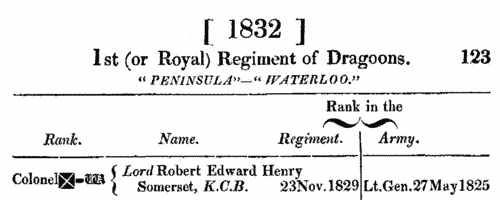
| Merchants, Bankers, Shipowners and Traders of London
(1834)
The public prints of December 1834 carried this loyal address to king William IV of merchants, bankers, shipowners, traders and others connected with the city of London, requesting 'permission at the present juncture to address your Majesty for the purpose of renewing the expression of our dutiful and loyal attachment to your Majesty’s person and crown. Deeply sensible of the practical blessings we have hitherto enjoyed under our wisely mixed constitution of King, Lords, and Commons, and feeling that the free and legitimate exercise of the Royal prerogative forms an integral part of that constitution (as essential to the maintenance of our own liberties as to the power and dignity of the Throne), we beg humbly to assure your Majesty of our determination steadfastly to uphold the same by every means in our power.
'Feeling, in common with all classes of your Majesty’s subjects, the deep importance of applying to all real abuses, wherever they may be found, a wholesome and timely correction, and of effecting in our excellent institutions every improvement of which careful examination and experience may prove them to be susceptible, we desire further dutifully to express our entire confidence that these useful purposes will ever occupy your Majesty’s paternal care. Nor can we permit ourselves to believe that the importance of these objects will be less apparent to those to whom the powers of government have been recently intrusted.'
Full names are given (or surname with initials), and address. Over 5000 subscribed.
UNWIN. Cost: £6.00.  | Sample scan, click to enlarge
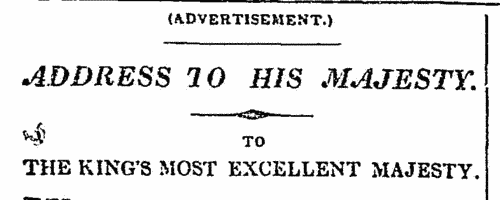
| Boys entering Sherborne School
(1823-1835)
The grammar school at Sherborne in Dorset, which doubtless existed from the creation of the diocese of Sherborne in 705, was refounded by king Edward VI in 1550. At the quatercentenary in 1950, a fourth edition of the Sherborne Register was published, listing boys entering the school during those four centuries. In truth, the materials for this register survive but fitfully before 1823; for some years, no names are known; sometimes all that is known is a surname. But from 1823 onwards the lists and the details get steadily more comprehensive. By the 20th century the boys are listed alphabetically by surname under term of entrance. Surname is given in bold, then christian names, name of father (surname and initials) and address; year of birth; house (a, School House; b, Abbey House; c, The Green; d, Harper House (formerly The Retreat); f, Abbeylands; g, Lyon House; h, Westcott House); whether represented the school at cricket (xi), football (xv), shooting (viii), &c.; year of leaving; summary of degrees, career &c.; and (in italics), address as of 1950. Names in the early lists marked with an asterisk are found inscribed on the oak panelling or on the stone walls of the former schoolroom. (F) in the lists indicates a foundationer, receiving free education: after 1827, when this privilege was restricted to boys from Sherborne and neighbourhood, nearly all foundationers were day-boys.UNWIN. Cost: £4.00.  | Sample scan, click to enlarge
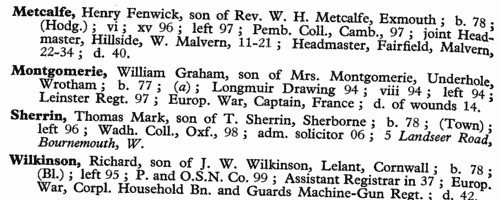
| Insolvents
(1835)
Insolvency notices for England and Wales: insolvency often caused people to restart their lives elsewhere, so these are an important source for lost linksUNWIN. Cost: £6.00.  | Sample scan, click to enlarge

|  British merchant seamen
(1835-1836) British merchant seamen
(1835-1836)
At this period, the foreign trade of ships plying to and from the British isles involved about 150,000 men on 15,000 ships; and the coasting trade about a quarter as many more. A large proportion of the seamen on these ships were British subjects, and so liable to be pressed for service in the Royal Navy; but there was no general register by which to identify them, so in 1835 parliament passed a Merchant Seamen's Registration Bill. Under this act this large register of British seamen was compiled, based on ships' crew lists gathered in British and Irish ports, and passed up to the registry in London. Each seaman was assigned a number, and the names were arranged in the register by first two letters of the surname (our sample scan shows one of the pages for 'Sm'); in addition, an attempt was made to separate out namesakes by giving the first instance of a name (a), the second (b), and so on. But no effective method was devised to prevent the same man being registered twice as he appeared in a second crew list; moreover, the original crew lists were clearly difficult for the registry clerks to copy, and some of the surname spellings appear to be corrupted. A parliamentary committee decided that the system devised did not answer the original problem, and this register was abandoned after less than two years: but it is an apparently comprehensive source for British merchant seamen in 1835 to 1836. The register records the number assigned to each man; his name; age; birthplace; quality (master, captain, mate, 2nd mate, mariner, seaman, fisherman, cook, carpenter, boy &c.); and the name and home port of his ship, with the date of the crew list (usually at the end of a voyage). Most of the men recorded were born in the British Isles, but not all (for instance, Charleston and Stockholm appear in the sample scan). The final column 'How disposed of' is rarely used, and indicates those instances where a man died, was discharged, or deserted his ship during the voyage.UNWIN. Cost: £8.00.  | Sample scan, click to enlarge
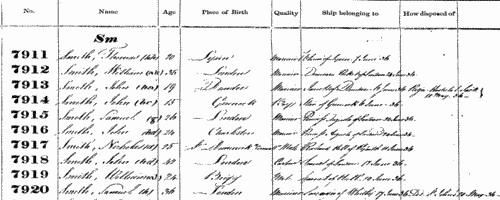
| Dissolutions of Partnerships
(1836)
Trade partnerships dissolved, or the removal of one partner from a partnership of several traders, in England and Wales
UNWIN. Cost: £6.00.  | Sample scan, click to enlarge

| Insolvents
(1836)
Insolvency notices for England and Wales: insolvency often caused people to restart their lives elsewhere, so these are an important source for lost linksUNWIN. Cost: £6.00.  | Sample scan, click to enlarge

| London and Middlesex crimes tried at the Central Criminal Court: victims and witnesses
(1836)
Henry Buckler copied in shorthand the proceedings of trials at the Central Criminal Court in London, and his transcripts were printed. This volume (iii), from 1836, covers sessions i to vi of the Copeland mayoralty of 1835 to 1836. The bulk of the cases were from London and Middlesex, with separate sections for Essex, Kent and Surrey, but, preceding all these, Capital Convictions. The names of the accused are annotated with an asterisk to show if they had previously been in custody; an obelisk indicates a known associate of bad characters. Most cases resulted in a guilty verdict, and a large proportion of these led to a sentence of transportation to Australia. This index covers the victims, witnesses (including constables) and others incidentally named in the London and Middlesex cases of January 1836.UNWIN. Cost: £6.00.  | Sample scan, click to enlarge
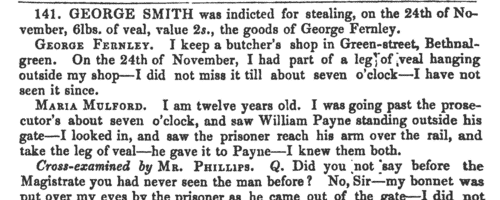
| British in India and Ceylon, China and Australasia
(1837)
Births, marriages and deaths, civil, ecclesiastical and military promotions, furloughs, reports of shipping to and from England and the East, with passenger lists, and news items published in the Asiatic Journal
UNWIN. Cost: £6.00.  | Sample scan, click to enlarge

|
Research your ancestry, family history, genealogy and one-name study by direct access to original records and archives indexed by surname.
|













